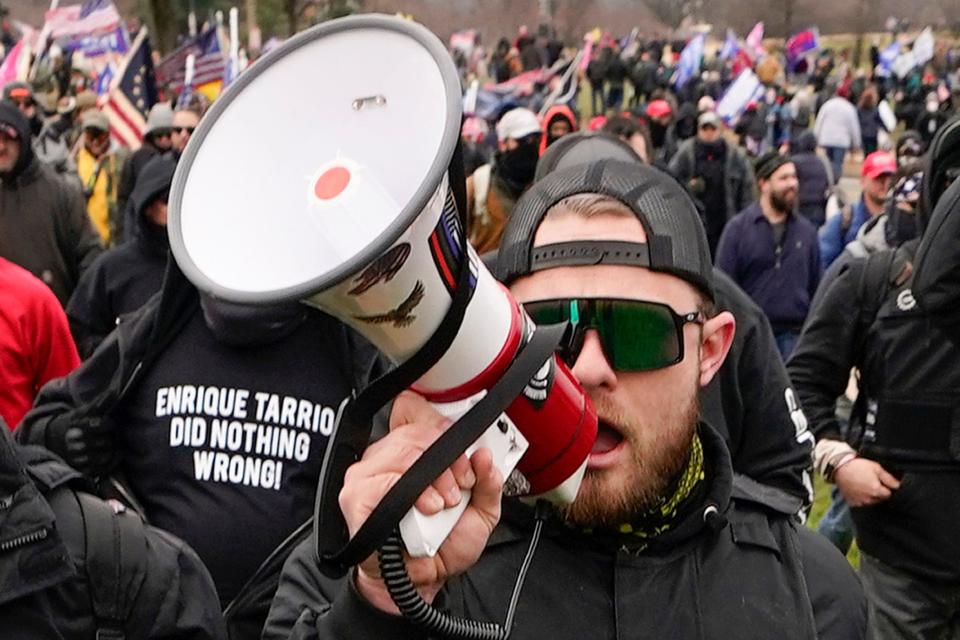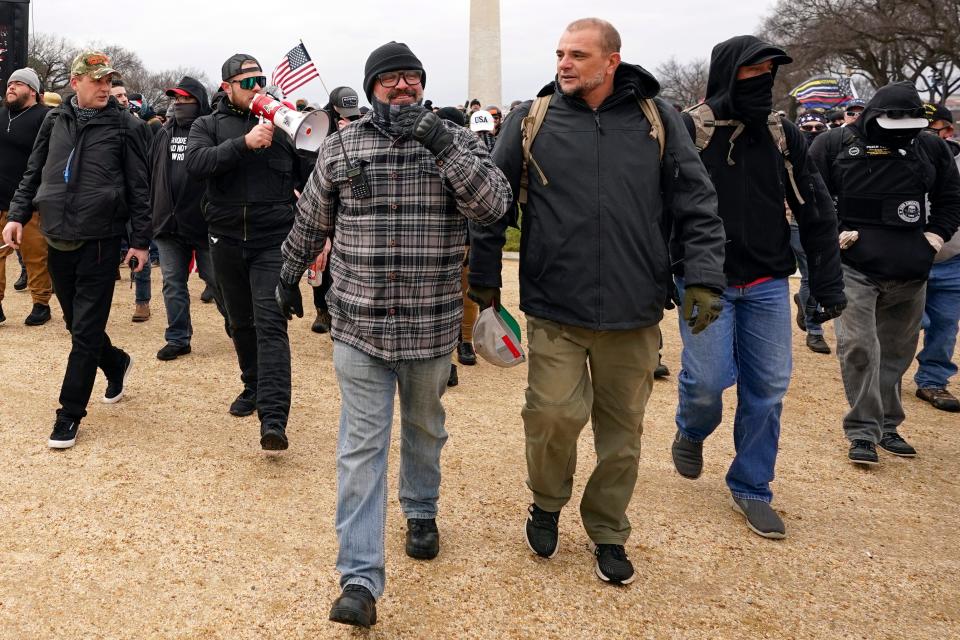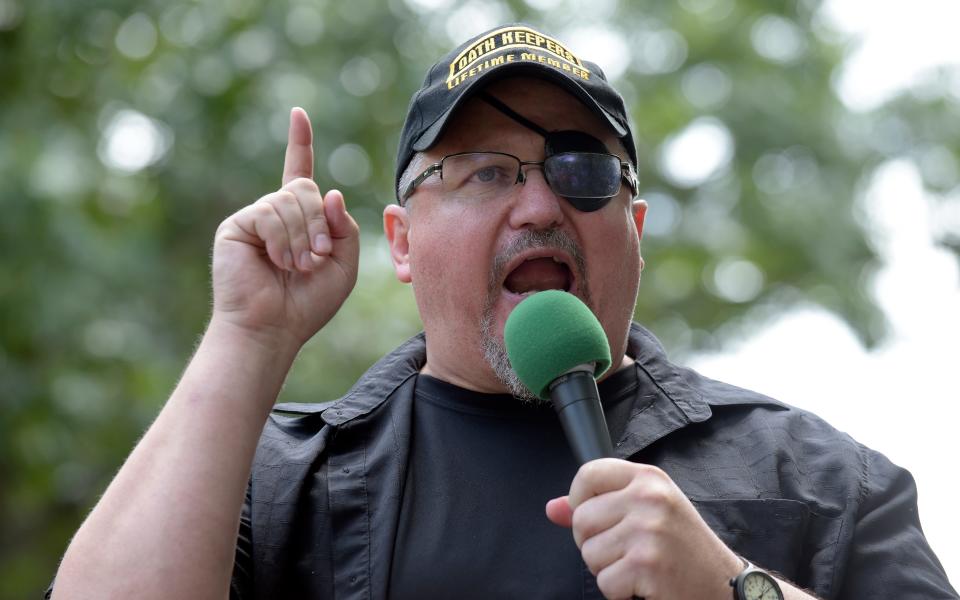'Trial tax': Proud Boys members complain their long prison sentences punish them for demanding a trial
- Oops!Something went wrong.Please try again later.
- Oops!Something went wrong.Please try again later.
WASHINGTON – Nobody seems happy with the long sentences for convicted leaders of the Capitol attack on Jan. 6, 2021.
Defendants have appealed their sentences as too long. The Justice Department has appealed some as too short. The result is the evidence and punishments from the worst attack on the Capitol in 200 years will be scrutinized for months or years to come.
Legal experts say defendants almost always appeal sentences, while the government rarely does, because judges have broad discretion to determine punishment.
Proud Boys member Ethan Nordean, who was sentenced Friday to 18 years in prison, filed a notice Wednesday he would appeal his sentence. His is the second-longest sentence related to Jan. 6, after Proud Boys leader Enrique Tarrio was sentenced Tuesday to 22 years in prison.
Two of their co-defendants, Proud Boys members Joseph Biggs and Zachary Rehl, were sentenced Aug. 31 to 17 years and 15 years, respectively. They filed a plea offer Wednesday that they received from the government before trial in October 2022.
Each of the Proud Boys defendants were offered sentences in exchange for guilty pleas that were less than half of what they received after trial. Norman Pattis, a lawyer for Biggs and Rehl, called the longer sentences proposed by the government a “trial tax” in violation of their Sixth Amendment right to trial.
“In effect, the defendants were punished because they demanded their right to trial,” Pattis wrote in his filing.

Plea deals trade shorter sentences for certain convictions: legal experts
Legal experts said it's "extremely common" for plea agreements to offer shorter sentences before trial and defendants are encouraged to reach a deal because of the high rate of federal convictions at trial.
"At times, the differences can be dramatic," said Kendall Coffey, a former U.S. attorney in Miami now in private practice at Coffey Burlington. "While some criticize this reality as a penalty for going to trial, the law and the prevailing prosecution philosophy recognizes that at least some greater leniency should be accorded for those willing to accept responsibility for their crimes."
Barbara McQuade, a former U.S. attorney in Michigan and now a law professor at the University of Michigan, said the argument about a "trial tax" is raise frequently, but "typically to no avail." The bargain is a shorter sentence in exchange for the certainty of a conviction and saving of government resources, she said.
"What the government was offering in exchange for a guilty plea was a benefit − a shorter sentence that they were otherwise exposed to," McQuade said. "By rejecting the plea deal, the defendants rejected the opportunity to receive that benefit. After trial, then, they face the sentence commensurate with their crime."
"You can’t have your cake and eat it, too," McQuade added.

Proud Boys members rejected plea deals with sentences half as long as they received after trial
Nordean’s appeal comes after at least eight members of the Oath Keepers, whose members formerly in the armed forces or law enforcement wore body armor and surged into the Capitol in military formation, appealed their cases.
The Proud Boys received a 12-page offer for plea agreements with a deadline of Oct. 27, 2022. The deal proposed sentences far shorter than what the five received after trial:
Tarrio was sentenced to 22 years and could have pleaded guilty with a recommendation of a nine- to 11-year sentence.
Nordean was sentenced to 18 years and could have pleaded guilty with a recommendation of a six- to eight-year sentence.
Biggs was sentenced to 17 years and could have pleaded guilty with a recommendation of a six- to eight-year sentence.
Rehl was sentenced to 15 years and could have pleaded guilty with a recommendation of a six- to seven-year sentence.
Dominic Pezzola was sentenced to 17 years and could have pleaded guilty with a recommendation of a four- to five-year sentence.

Justice Department appealed Oath Keepers sentences as too short
The Justice Department is appealing Oath Keeper sentences ranging up to 18 years as too short.
Among Oath Keepers members, at least Kenneth Harrelson, Jessica Watkins, Roberto Minuta, David Moerschel, Stewart Rhodes, Kelly Meggs, Joseph Hackett and Edward Vallejo have each appealed.
But the Justice Department has appealed the sentences as too short. Harrelson got four years. Watkins got eight and a half years. Minuta got four and a half years. Moerschel got three years. Rhodes got 18 years. Meggs got 12 years. Hackett got three and a half years. Vallejo got three years.
Legal experts said it's common for defendants to appeal their sentences in almost every case. But prosecutors rarely appeal sentences because judges have great leeway to fashion sentences after a 2005 Supreme Court decision called Booker v U.S., which made sentencing guidelines advisory rather than mandatory.
"Unless the sentence is wildly outside of the guidelines range, and the court fails to articulates on the record its reasons for calculating the sentence as they did, sentences are typically affirmed on appeal," McQuade said.
This article originally appeared on USA TODAY: 'Trial tax': Proud Boys complain long sentences punish them for trials

